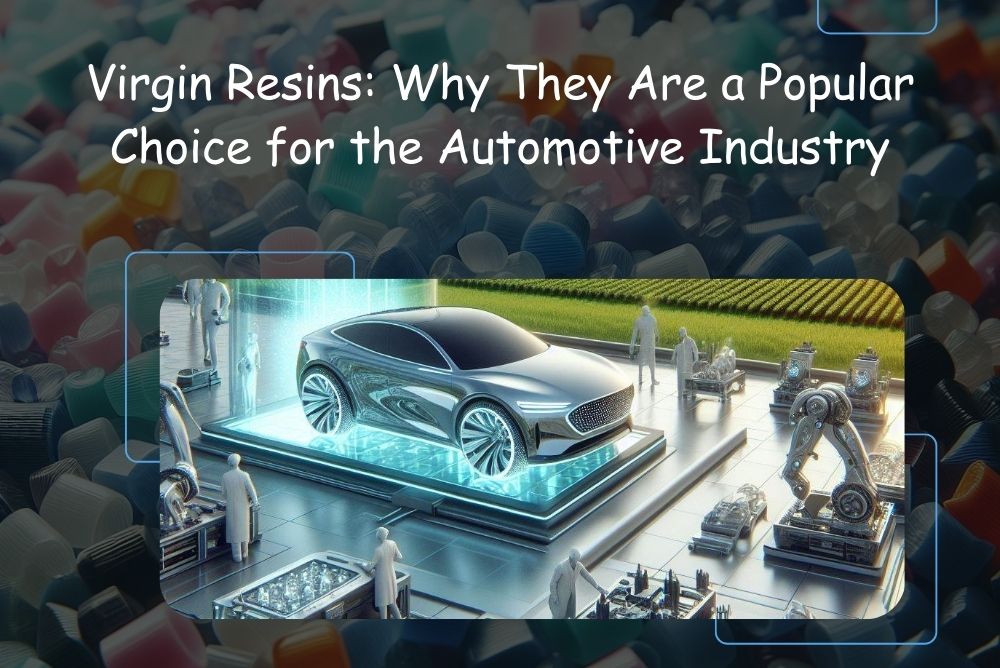
Quality plastic resins have revolutionized many industries over the years in terms of material selection that is equivalent to metal in terms of thermal and other properties. This is applicable to the automotive industry as well. The integration of plastic resins has transformed vehicle design, weight, performance, and other features. Thermally-resistant virgin plastic resins are widely used in this sector. They strike a perfect balance between performance, environmental sustainability, and cost efficiency. Is that all? Obviously not. Are you interested in knowing the importance of virgin resins in the automotive industry, their properties, applications, and more? This post highlights the ins and outs of virgin resins in the automotive industry.
Virgin Plastic and Its Properties that Drive Innovation
It is the purest form of resin. As the term suggests, it refers to the plastic material that has never been processed or used in manufacturing applications. The resin is manufactured from natural resources such as petrochemical feedstock, crude oil, natural gas, etc. Virgin plastic has gained immense traction in the automotive industry because it offers excellent durability and structural integrity depending on the type of plastic. HDPE, LDPE, LLDPE, and polypropylene are popular virgin plastic resin types used in the industry. The following properties of virgin resins make them attractive for automotive manufacturers.
- Automobile production demands consistent and predictable performance. Virgin resins offer purity, strength, durability, and wear and tear resistance, contributing to their widespread adoption in various vehicle components.
- This resin is known for its moldability, allowing manufacturers to create intricate designs and complex shapes. This is important in the automotive industry, where aerodynamics, safety, and aesthetics play pivotal roles in design.
- The thermal stability of a resin makes it suitable for applications that involve exposure to a wide range of temperatures.
Applications in the Automotive Spectrum
Virgin resin has various applications in the automotive sector, from interior components to under-the-hood parts. Here are some typical applications.
- Interior Components: Virgin resins are an indispensable part of the interior of vehicles. This includes dashboard components, seat structures, and more. Its moldability allows for creating aesthetically pleasing, lightweight, and ergonomic designs. This helps in enhancing the overall driving experience.
- Electrical and Electronic Systems: With the increasing integration of advanced electronics in vehicles, virgin resin is utilized to produce electrical and electronic components casings. Its insulating properties and resistance to electrical conductivity make it a suitable choice for these applications.
- Exterior Body Panels: Virgin resins are durable and lightweight. Thus, they are used for exterior body panels. Their ability to withstand the rigors of the road, including impacts and harsh weather conditions, contributes to the longevity and safety of vehicles.
- Safety Features: Virgin resin finds application in airbag housings and structural components. It can maintain structural integrity under stress and contributes to the overall safety performance of modern vehicles.
Innovative Technological Advances
Automotive manufacturing is ever-changing with technological innovations. The role of virgin plastic resin is poised to evolve as the industry seeks to meet challenging demands and regulatory requirements.
- Advanced Formulations: Many ongoing research and development initiatives are mainly focused on enhancing the properties of virgin resins. This includes incorporating additives and reinforcements to improve characteristics such as impact resistance, flame retardance, and UV resistance.
- Sustainable Practices: Incorporating sustainability in manufacturing drives the exploration of more environmentally friendly alternatives. Some manufacturers invest in closed-loop systems, where waste generated in production is recycled and reused, reducing the overall environmental footprint.
- Integration with Emerging Technologies: As the automotive industry embraces advanced technologies, such as electric and autonomous vehicles, the role of virgin resins becomes even more critical. These technologies pose unique challenges and opportunities, and virgin resins will likely play a vital role in meeting these demands.
Challenges in the Adoption of Virgin Resins in the Automotive Industry
The integration of virgin plastic resins in the automotive industry, while promising, is not without its set of challenges. Let’s have a look at it.
- The economic aspect is one of them. Compared to recycled alternatives, the production cost of virgin resins can be high. This cost differential poses a consideration for manufacturers with budget constraints.
- Although it is the purest form of resin, its production often involves extracting and processing fossil fuels, contributing to environmental degradation and carbon emissions. As sustainability becomes paramount in the automotive sector, navigating through the environmental impact of virgin resin usage becomes critical for researchers and manufacturers.
- Consumer perceptions and preferences can also influence the adoption of virgin resins. Some consumers prioritize eco-friendly and recycled materials. This poses a big challenge for manufacturers to effectively communicate virgin resins’ environmental benefits and future recyclability.
- Regulatory landscapes and standards in different regions may impact the widespread adoption of virgin resins. Manufacturers must navigate diverse requirements, potentially leading to complexities ensuring compliance and consistency in using virgin resins across markets.
Incorporating virgin plastic resins has improved the safety and performance of automobiles and opened doors for unprecedented design possibilities. As automotive technology advances, its role in shaping the industry’s future will become even more pronounced, driving innovation, efficiency, and more. Whether you’re an automaker or a third-party vendor in the automotive industry, the need for high-quality plastic resins is paramount in crafting superior vehicle components. Consult a reliable expert in the resins segment, such as Mid Continent Plastics, for your plastic resin needs. It is a one-stop solution for all your requirements regarding premium plastic resins, maintaining a comprehensive inventory, and sourcing top-tier supplies throughout the United States. Connect with their team to ensure your access to the finest materials for crafting automotive parts with precision and excellence.